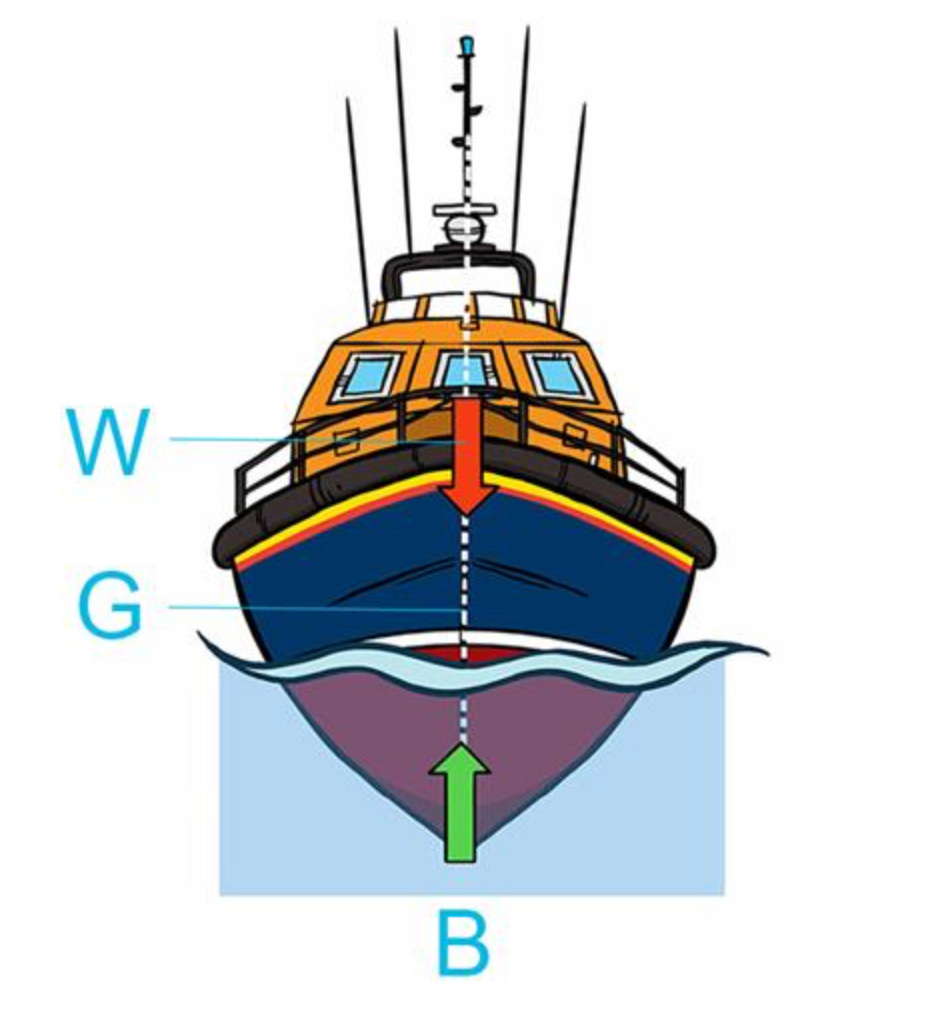Dear friends
How does a real-life lifeboat stay buoyant in even the roughest of seas? How do the famously self-righting vessels of the RNLI return to stability even when fully capsized, so they can still help others in difficulty? As this newsletter is called The Life Boat, I thought I should find out.
As it turns out, there is much to learn from the resilience of the Shannon, Severn, Trent, Tamar and Mersey class of RNLI all-weather Lifeboats.
I credit
with first drawing my attention to what we might learn from boats. Ever since I read her wonderful post on the subject I’ve been thinking about it.The RNLI explain on their website that a boat floats because of the relationship between two opposing forces: gravity and buoyancy. The weight of the boat (W) pushing down (G) is balanced by the buoyancy (B) of the water pushing against the hull. Without enough gravity, a boat will bob on the surface, catch the wind, unstable and difficult to control. Too much gravity and it will sink. A boat floats upright and follows a true course when all these forces are balanced.
When wind or wave start to tip a boat over the underwater shape changes and the balance shifts. A horizontal gap (H) between the centre of gravity (G) and the centre of buoyancy (B) changes. In an unstable boat this gap becomes so wide the boat just flips over and finds a new, unfortunate stability, capsized. In a well-designed lifeboat, however, inbuilt buoyancy will always push the boat back upright.
Because it’s sealed shut, a lifeboat’s wheelhouse adds more buoyancy as it’s submerged underwater. It’s designed to stay full of air. The wild sea can tip a lifeboat far out from its centre of gravity, even flip it right over. It will always manage to right itself.
Life lessons from the lifeboat?
Gravity is weight and rootedness.
It’s earth and community and love of our place and steady work that we hope is of some service to others. I’m aware that, perhaps since COVID, I’ve taken root, dug in, worked steadily, mostly stayed put. Restlessness, I thought, was a symptom of discontent and distraction.
I’ve felt the weight of gravity anchor me in place and thought that would offer me stability. But gravity on its own will eventually pull you down. I’ve been feeling that heaviness lately.
Buoyancy, on the other hand, is lightness. It’s fresh air.
It’s remembering to go outside and take a deep breath under the open sky.
It’s joy and fun and friendship and laughter and dancing.
It’s allowing some pockets in the day to remain unfilled. It’s silence. It’s spaciousness. It’s rest. It’s sitting still, allowing the internal mind chatter to go quiet.
It’s these gaps and openings in our lives that offer us buoyancy.
We need both gravity and buoyancy, in balance with each other, to regain our stability when life knocks us off course. We’re of no use to anyone without this resilience. I for one, have been neglecting buoyancy lately. Perhaps you have too.
If so, take this as a reminder.
And here’s a breath of bracing Orkney air for you, laced with the sharp ammonia of seabird guano.
The Life Raft Co-Working Session
This week’s little Life Raft Co-Working session will convene on Zoom on Wednesdays at 3 pm (UK time). Like kayakers in rough seas, we raft up together for a little while, with a bit of chat and some quiet time to work on our projects in shared silence. Join us at the link below. It’s the same link each week so you can bookmark it and use it again.
Thank you, as always for reading the Life Boat. Thanks especially to my new paid subscribers. If you can’t manage a paid sub (I know, they add up!) you can support me by helping other readers find The Life Boat. Click the little heart icon at the top or bottom of this email or hit ‘share’ to send it to a friend you think might enjoy reading.
May you find spaciousness, air and light this week
– Sam
In












Thanks very much, Sam for your thoughtful piece. It reminded me about an exhibit I saw in a museum in Reykjavik. The sailing boat had a canvas bag attached to the side of the boat. 'Ylir: a mechanism for 'pouring oil on troubled waters' widely used in the 19th century. Fish oil trickled out to form a slick on the sea, which calmed the waves to some extent.'
This is timely (and aren't lifeboats, the whole concept of them, splendid). I have been feeling very heavy of late, stuck wallowing in the doldrums, or on the rocks. I'm certainly in need of more lightness and space to clear my mind.